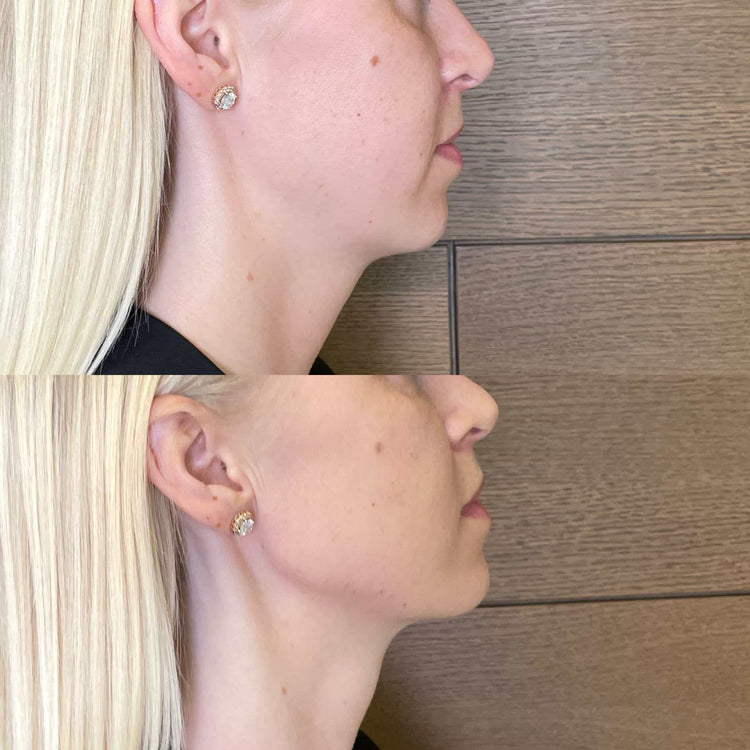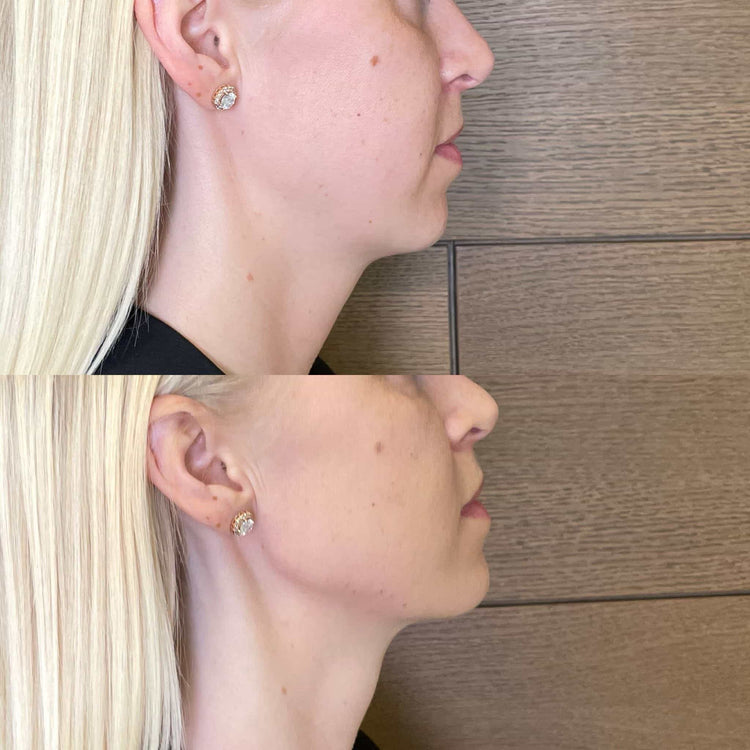Swelling and Bruising Management
After receiving jaw fillers, managing swelling and bruising is essential for achieving optimal results and minimizing discomfort.
Immediate Post-Procedure Care
Following jaw filler treatment in London, it’s crucial to follow your practitioner’s instructions carefully. Generally, applying ice packs wrapped in a towel for 15-20 minutes at a time, several times a day, can help minimize swelling. Elevating the head while sleeping also aids in reducing fluid accumulation. Over-the-counter pain relievers like ibuprofen can manage any discomfort. Avoid touching or rubbing the treated area to prevent further irritation.
It’s important to abstain from strenuous activities and intense exercise for a few days post-treatment to allow the filler to settle and minimize the risk of bruising or shifting. You may also be advised to avoid alcohol consumption and smoking, as these can hinder the healing process.
Maintaining good hydration by drinking plenty of water is essential for supporting tissue healing. Lastly, it’s recommended to avoid direct sun exposure and use sunscreen on treated areas once swelling subsides to prevent pigmentation changes.
Cold Compresses
Cold compresses are a valuable tool in managing swelling and bruising following jaw filler treatment. Apply an ice pack wrapped in a towel to the affected area for 15-20 minutes at a time, several times a day. This helps constrict blood vessels and reduce inflammation.
Remember to avoid direct contact between the ice and your skin, as this can cause damage.
Elevation
After receiving jaw fillers in London, managing swelling and bruising is crucial for optimal results. Following your practitioner’s instructions carefully is essential.
- Applying ice packs wrapped in a towel for 15-20 minutes at a time, several times a day can minimize swelling.
- Elevating the head while sleeping helps reduce fluid accumulation.
- Over-the-counter pain relievers like ibuprofen can manage any discomfort.
- Avoid touching or rubbing the treated area to prevent further irritation.
- Refrain from strenuous activities and intense exercise for a few days post-treatment to allow the filler to settle and minimize bruising or shifting.
- Avoid alcohol consumption and smoking, as they can hinder the healing process.
- Maintain good hydration by drinking plenty of water to support tissue healing.
- Avoid direct sun exposure and use sunscreen on treated areas once swelling subsides to prevent pigmentation changes.
Pain Relief
Jaw filler treatment can enhance facial features, but proper aftercare is vital for achieving natural-looking results.
Over-the-Counter Medications
Over-the-counter pain relievers like ibuprofen or naproxen are commonly used to manage discomfort associated with various conditions, including headaches, muscle aches, and inflammation. These medications work by reducing the production of prostaglandins, substances that contribute to pain and swelling.
It’s important to follow the recommended dosage instructions on the medication label or as advised by a healthcare professional.
Individuals with pre-existing medical conditions or those taking other medications should consult with a doctor before using over-the-counter pain relievers to ensure there are no potential interactions.
Prescription Medications (if necessary)
After receiving jaw fillers, managing swelling and bruising is crucial for optimal results. Following your practitioner’s instructions carefully is essential.
Applying ice packs wrapped in a towel for 15-20 minutes at a time, several times a day can minimize swelling. Elevating the head while sleeping helps reduce fluid accumulation. Over-the-counter pain relievers like ibuprofen can manage any discomfort. Avoid touching or rubbing the treated area to prevent further irritation.
Refrain from strenuous activities and intense exercise for a few days post-treatment to allow the filler to settle and minimize bruising or shifting. Avoid alcohol consumption and smoking, as they can hinder the healing process. Maintain good hydration by drinking plenty of water to support tissue healing.
Avoid direct sun exposure and use sunscreen on treated areas once swelling subsides to prevent pigmentation changes.
Over-the-counter pain relievers like ibuprofen or naproxen are commonly used to manage discomfort associated with various conditions, including headaches, muscle aches, and inflammation. These medications work by reducing the production of prostaglandins, substances that contribute to pain and swelling.
It’s important to follow the recommended dosage instructions on the medication label or as advised by a healthcare professional. Individuals with pre-existing medical conditions or those taking other medications should consult with a doctor before using over-the-counter pain relievers to ensure there are no potential interactions.
Infection Prevention
Jaw fillers can provide a subtle enhancement to facial features, but achieving the desired outcome relies heavily on proper aftercare.
Hygiene Practices

Maintaining good hygiene practices is essential for preventing infections and promoting overall health. Proper handwashing is one of the most effective ways to reduce the spread of germs.
Wash your hands thoroughly with soap and water for at least 20 seconds, especially before eating, after using the restroom, and after contact with potentially contaminated surfaces.
When soap and water are not available, use an alcohol-based hand sanitizer with at least 60% alcohol.
Keep your surroundings clean and tidy by regularly disinfecting frequently touched surfaces such as doorknobs, countertops, and phones.
Cover your mouth and nose when coughing or sneezing to prevent the spread of respiratory droplets.
Avoid close contact with individuals who are sick.
Signs of Infection to Watch For
Infection prevention is crucial for maintaining good health. Being aware of the signs of infection can help you take timely action and seek appropriate medical care.
Common signs of infection include fever, chills, redness, swelling, pain, warmth to the touch, fatigue, and a general feeling of malaise.
If you experience any of these symptoms, it’s important to consult a healthcare professional for diagnosis and treatment.

Activity Restrictions
After receiving jaw fillers, understanding activity restrictions is essential for optimal healing and achieving desired results.
Exercise
After receiving jaw fillers, certain activities need to be limited to allow the filler to settle properly and minimize bruising or shifting.
Strenuous activities and intense exercise should be avoided for a few days post-treatment. This includes high-impact workouts, heavy weightlifting, and sports that involve forceful movements. It’s important to listen to your body and avoid any activity that causes discomfort or pain. Light walking and gentle stretches are generally acceptable as long as they don’t cause excessive strain.
Smoking and Alcohol Consumption
Activity restrictions are crucial after jaw filler treatment to ensure proper healing and minimize complications.
Strenuous activities and intense exercise should be avoided for at least a few days post-treatment. This includes high-impact workouts, heavy weightlifting, contact sports, and any activity that puts excessive strain on the treated area.
Light walking and gentle stretching are generally acceptable as long as they don’t cause discomfort or pain.
Smoking can negatively impact the healing process and increase the risk of complications following jaw filler treatment.
Nicotine constricts blood vessels, which can hinder circulation and impede the delivery of oxygen and nutrients to the treated area. This can slow down tissue regeneration and increase the risk of infection.
Alcohol consumption should also be limited after jaw filler treatment as it can interfere with the body’s natural healing process.
Alcohol can dehydrate the body, which can worsen swelling and bruising. It can also thin the blood, increasing the risk of bleeding and bruising.

Dermal Filler Follow-up Appointments
Follow-up appointments are an essential part of ensuring optimal results after jaw filler treatment in London. These appointments allow your practitioner to assess your healing progress, address any concerns you may have, and make any necessary adjustments to the treatment.
Schedule and Purpose
Follow-up appointments typically occur a few days to a week after the initial jaw filler treatment, depending on your individual needs and the recommendations of your practitioner.
During these appointments, your practitioner will examine the treated area, checking for any signs of swelling, bruising, or infection. They will also assess the placement and distribution of the filler to ensure it meets your desired aesthetic goals.
If necessary, minor adjustments can be made at this stage to fine-tune the results.
Your practitioner may also provide you with additional advice on aftercare and answer any questions you have about the treatment process and expected outcomes.
The frequency of follow-up appointments will vary depending on individual healing and desired results. Some patients may require only one or two follow-ups, while others may need more frequent appointments.
Your practitioner will be able to provide specific recommendations based on your unique circumstances.
Nutritional Support
Nutritional support is essential for maintaining overall health and well-being. It provides the body with the necessary nutrients to function properly, grow, and repair tissues.
Hydration
Nutritional support plays a vital role in the healing process after jaw filler treatment.
- A balanced diet rich in fruits, vegetables, whole grains, and lean protein provides essential vitamins, minerals, and antioxidants that support tissue regeneration and immune function.
- Adequate hydration is crucial for flushing out toxins and promoting circulation, which aids in the distribution of nutrients and removal of waste products.
Healthy Diet
Nutritional support plays a vital role in achieving optimal results after jaw filler treatment.
A well-balanced diet rich in fruits, vegetables, whole grains, and lean protein provides essential vitamins, minerals, and antioxidants that support tissue regeneration, collagen production, and immune function. Adequate hydration is also crucial for flushing out toxins, promoting circulation, which aids in the distribution of nutrients and removal of waste products.
Book your jaw filler treatment with Dr. Laura Geige at It’s Me & You Clinic for a defined jawline
- Low-Calorie THC Beverages: The Healthier Way To Get High - May 11, 2025
- Exosome Therapy For Skin Rejuvenation Near Burstow, Surrey - May 11, 2025
- How Much Is Tear Trough Filler - May 11, 2025
